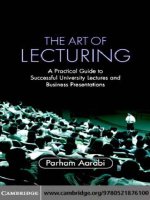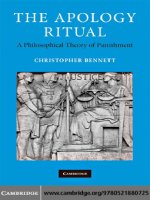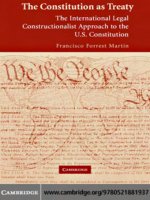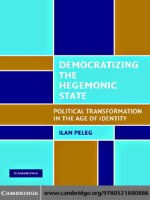cambridge university press the matadors cape americas reckless response to terror apr 2007 kho tài liệu bách khoa
Bạn đang xem bản rút gọn của tài liệu. Xem và tải ngay bản đầy đủ của tài liệu tại đây (1.19 MB, 379 trang )
P1: JZZ
0521875161pre
CUFX123/Holmes
January 30, 2007
This page intentionally left blank
i
14:56
P1: JZZ
0521875161pre
CUFX123/Holmes
January 30, 2007
14:56
THE MATADOR’S CAPE
The Matador’s Cape delves into the tangled causes and devastating consequences of American policy at home and abroad since 9/11. In a collection
of searing essays, the author explores Washington’s seemingly chronic inability to bring “the enemy” into focus, detailing the ideological, bureaucratic,
electoral, and (not least) emotional forces that have warped America’s understanding of, and response to, the terrorist threat. He also shows how the
gratuitous and murderous shift of attention from al Qaeda to Iraq was shaped
by a series of misleading theoretical perspectives on the end of deterrence, the
clash of civilizations, humanitarian intervention, unilateralism, democratization, torture, intelligence gathering, and wartime expansions of presidential
power. The author’s breadth of knowledge on the War on Terror leads to conclusions about present-day America that are at once sobering in their depth
of reference and inspiring in their global perspective.
After receiving his Ph.D. from Yale in 1976, Stephen Holmes taught briefly
at Yale University before becoming a member of the Institute for Advanced
Study in Princeton in 1978. He then moved to Harvard University’s Department of Government, where he stayed until 1985, the year he joined the
faculty at the University of Chicago.
At Chicago, Holmes served as Director of the Center for the Study of Constitutionalism in Eastern Europe and as editor-in-chief of the East European
Constitutional Review. In 1994–96, he was the Director of the Soros Foundation program for promoting legal reform in Russia and Eastern Europe.
From 1997 to 2000, he was Professor of Politics at Princeton University.
Holmes’ research centers on the history of European liberalism, the disappointments of democracy and economic liberalization after communism, and
the challenge of combating transnational terrorism within the bounds of the
rule of law. In 1984, he published Benjamin Constant and the Making of Modern Liberalism. Since then, he has published numerous articles on democratic
and constitutional theory. In 1988, he was awarded a Guggenheim Fellowship to complete a study of the theoretical foundations of liberal democracy.
He was a member of the Wissenschaftskolleg in Berlin during the 1991–92
academic year. His Anatomy of Antiliberalism appeared in 1993. And in 1995,
he published Passions and Constraint: On the Theory of Liberal Democracy. In
1999, his The Cost of Rights, coauthored with Cass Sunstein, appeared. For
his research on the derailing of Russian legal reform, he was named a Carnegie
Scholar in 2003–05.
i
P1: JZZ
0521875161pre
CUFX123/Holmes
January 30, 2007
ii
14:56
P1: JZZ
0521875161pre
CUFX123/Holmes
January 30, 2007
14:56
THE
MATADOR’S
CAPE
America’s
Reckless Response
to Terror
STEPHEN HOLMES
Walter E. Meyer Professor of Law
New York University School of Law
iii
CAMBRIDGE UNIVERSITY PRESS
Cambridge, New York, Melbourne, Madrid, Cape Town, Singapore, São Paulo
Cambridge University Press
The Edinburgh Building, Cambridge CB2 8RU, UK
Published in the United States of America by Cambridge University Press, New York
www.cambridge.org
Information on this title: www.cambridge.org/9780521875165
© Stephen Holmes 2007
This publication is in copyright. Subject to statutory exception and to the provision of
relevant collective licensing agreements, no reproduction of any part may take place
without the written permission of Cambridge University Press.
First published in print format 2007
eBook (EBL)
ISBN-13 978-0-511-27808-2
ISBN-10 0-511-27808-X
eBook (EBL)
ISBN-13
ISBN-10
hardback
978-0-521-87516-5
hardback
0-521-87516-1
ISBN-13
ISBN-10
paperback
978-0-521-69787-3
paperback
0-521-69787-5
Cambridge University Press has no responsibility for the persistence or accuracy of urls
for external or third-party internet websites referred to in this publication, and does not
guarantee that any content on such websites is, or will remain, accurate or appropriate.
P1: JZZ
0521875161pre
CUFX123/Holmes
January 30, 2007
For Francesco
v
14:56
P1: JZZ
0521875161pre
CUFX123/Holmes
January 30, 2007
vi
14:56
P1: JZZ
0521875161pre
CUFX123/Holmes
January 30, 2007
14:56
CONTENTS
Acknowledgments
Introduction
page ix
1
PART I: THE TERRORIST ENIGMA
1
Did Religious Extremism Cause 9/11?
13
PART II: SHOW OF FORCE
2
3
4
5
Why Military Superiority Breeds Illusions
How the War was Lost
Radicals Trapped in the Past
A Self-Inflicted Wound
71
82
92
107
PART III: FALSE TEMPLATES
6
7
8
9
Searching for a New Enemy after the Cold War
Humanitarianism with Teeth
The War of the Liberals
The Neoconservative Intifada
131
157
178
197
PART IV: WAIVING THE RULES
10 Liberalism Strangled by War
11 The Unilateralist Curse
12 Battling Lawlessness with Lawlessness
13 The Infallibility Trap
Conclusion
215
Notes
333
Index
357
235
257
286
303
vii
P1: JZZ
0521875161pre
CUFX123/Holmes
January 30, 2007
viii
14:56
P1: JZZ
0521875161pre
CUFX123/Holmes
January 30, 2007
14:56
ACKNOWLEDGMENTS
Most of the ideas in this book were first elaborated in the Law and Security Colloquium at the New York University School of Law. To Richard
Pildes, David Golove, and Noah Feldman – my brilliant friends and codirectors in the Colloquium – I therefore owe an enormous debt. For
their incisive and often humbling comments on various chapters I need to
thank not only Golove and Feldman, but also many other friends and colleagues, including Bruce Ackerman, Samuel Beer, Tom Carothers, Kiren
Chaudhry, Arista Cirtautas, Amos Elon, Jon Elster, John Ferejohn, Diego
Gambetta, Venelin Ganev, David Garland, Tom Geoghegan, Moshe
Halbertal, Helen Hershkoff, Helge Høibraaten, Jamie Holmes, Ivan
Krastev, David Luban, Bernard Manin, John McCormick, Claus Offe,
Pasquale Pasquino, Patrizia Pinotti, Richard Posner, Adam Przeworski,
Adam Shatz, Paul Starr, Tzvetan Todorov, Leon Wieseltier, and David
Woodruff. I am grateful to them all. Only Katie Sticklor knows what mortifications I have been spared by her unerring proofreader’s eye. Heartfelt
thanks also go to John Berger, my editor at Cambridge University Press,
who gently coaxed me into producing this book in record time. To Karen
Greenberg, the founding Director and guiding spirit of the Law School’s
Center on Law and Security, my debt, as much personal as professional,
is simply too costly to repay.
Most of the chapters in this book are reconceived and rewritten versions
of earlier publications. For the right to use this material, I thank the original publishers. The earlier versions first appeared as follows: Chapter One
in Diego Gambetta (ed.), Making Sense of Suicide Missions (2005); Chapter Two in The American Prospect (April 2003); Chapter Three in The
American Prospect (June 2006); Chapter Four in The Nation (May 10,
2004); Chapter Five in The London Review of Books (May 6, 2004); Chapter Six in The London Review of Books (April 24, 1997); Chapter Seven
ix
P1: JZZ
0521875161pre
x
CUFX123/Holmes
January 30, 2007
14:56
Acknowledgments
in The London Review of Books (November 14, 2002); Chapter Eight in
The Nation (November 14, 2005); Chapter Nine in The London Review
of Books (October 5, 2006); Chapter Ten in The New Republic (February
28, 2005); Chapter Eleven in The New Republic (November 19, 2001);
Chapter Twelve in Karen Greenberg (ed.), The Torture Debate in America
(Cambridge University Press, 2005); and Chapter Thirteen in The Nation
(May 1, 2006).
x
P1: KNP
0521875161int
CUFX123/Holmes
January 30, 2007
13:55
INTRODUCTION
“Terrorism wins only if you respond to it in the way that the terrorists
want you to, which means that its fate is in your hands.”
– David Fromkin
This book is an attempt to understand and explain America’s reckless
response to the terrorist attacks of 9/11. It builds on many previous
efforts to get the story straight about the al Qaeda attack, the invasion and
occupation of Iraq, and American counterterrorism policy more generally.
Learning how to think clearly about the 9/11 provocation and America’s
response to it is an obvious first step toward correcting the tragically misguided course on which the nation has embarked. What follows is my
modest contribution to that collective and ongoing endeavor.
A few prescient sentences, written in 1990 by Bernard Lewis to downplay the threat posed at that time by radical Islamists to the West, succinctly
convey the extent to which America’s response to 9/11 has grievously
backfired:
We should not exaggerate the dimensions of the problem. The Muslim
world is far from unanimous in its rejection of the West, nor have the
Muslim regions of the Third World been the most passionate and the
most extreme in their hostility. . . . Certainly nowhere in the Muslim
world, in the Middle East or elsewhere, has American policy suffered
disasters or encountered problems comparable to those in Southeast
Asia or Central America. There is no Cuba, no Vietnam, in the Muslim
world, and no place where American forces are involved as combatants
or even as “advisers.”1
Today, American policy has suffered a disaster comparable to those it
suffered earlier in Southeast Asia and elsewhere. The principal cause of
1
P1: KNP
0521875161int
2
CUFX123/Holmes
January 30, 2007
13:55
Introduction
that disaster is the involvement of American forces as combatants in the
Middle East. As a consequence of the U.S. occupation, the Muslim world
is increasingly passionate in its hostility to the West. Another consequence
is that Professor Lewis is no longer counseling his audiences to dial down
their expressions of alarm.
How did we get to this point?
To understand the cascading misconceptions, deceptions, and mistakes
of the Bush Administration, we need to start with the al Qaeda attack
itself. Part I, Chapter One examines in some detail the possible motivations of the 9/11 organizers and perpetrators. It aims to cast doubt on
the common assumption that religious extremism “caused” the attack.
There are several reasons for approaching the issue from a different angle.
Identifying the single dominant purpose of any complex action, whether
the 9/11 plot or the invasion of Iraq, will always be difficult. Although
they obviously played an important role in motivating the al Qaeda plotters, religious sentiments and commitments were not the only forces at
work. Case studies of the operation’s instigators, organizers, and perpetrators reveal a complex web of unstable and contradictory impulses and
convictions. One theme that constantly resurfaces, nevertheless, is a craving to avenge real and imagined injuries inflicted by the United States
on the Muslims of the world. Emphasizing religious extremism as the
motivator for the plot, whatever it reveals, also terminates inquiry prematurely, encouraging us to view the attack ahistorically, as an expression of
“radical Salafism,” a fundamentalist movement within Islam that allegedly
drives its adherents to homicidal violence against infidels. Emphasizing
the craving for revenge, by contrast, whatever it conceals, opens up a
wider and more historical perspective on past conditions and future consequences. It directs our attention to concrete events, such as Israel’s
crushing defeat of numerically superior Arab armies in 1967, which gave
rise to a need for payback and retribution. It has another advantage as well,
reminding us of the emotionally powerful lure of murderous retaliation,
of the trite but cruelly accurate observation that violence breeds violence
in an unending cycle, a primitive pattern that all civilization, including
liberal civilization, is ceaselessly struggling to overcome. By implication,
a focus on reprisal draws attention not only to the alleged injuries that
the 9/11 plotters believed themselves to be avenging, but also to the
possibility that America’s response was derailed by pre-rational impulses
and muddled causal thinking. The 9/11 attack was an act of mass murder
that can be analogized to a matador’s cape in the hands of a malevolent and crazed provocateur. Bin Laden himself has boasted that it is
“easy for us to provoke and bait this administration.”2 That the United
P1: KNP
0521875161int
CUFX123/Holmes
The Matador’s Cape
January 30, 2007
13:55
3
States would be tempted to react viscerally rather than with a cool head,
that it would be “goaded into a self-defeating reaction”3 such as an indiscriminate use of force, was not inevitable. The psychological quirks of a
few power wielders made it perfectly possible, however. Far from assessing
threats accurately, human beings typically overestimate or underestimate
the dangers around them. Keeping such potentially fatal cognitive biases
in mind is, therefore, the first step toward rethinking America’s overall
response to 9/11.
Despite a slew of carefully researched and insightful books on the subject, the reason why the United States responded to the al Qaeda attack
by invading Iraq remains to some extent an enigma. The Conclusion to
this book represents my own attempt to unravel that mystery. Many of
the crucial factors influencing the fateful choice for war are previewed in
Part II. The Pentagon’s irresponsible failure to prepare for the postwar
reflects Cheney and Rumsfeld’s facile optimism first of all. It also reflects
their inveterate September 10th mindset, namely a lifelong and unrevised conviction that hostile dictatorships are the only serious threats to
American security in the international environment (Chapter Two). Their
indifference to the very real threat posed to U.S. interests by state collapse, sectarian warfare, and violent criminalization in Iraq was so blithe
that the Cheney-Rumsfeld group did almost nothing, when destroying
Saddam’s iron-grip on his military arsenal, to prevent an unprecedented
proliferation disaster (Chapter Three). That disaster did not occur only
because, unbeknownst to the administration, Iraq did not possess the
stockpiles of WMD that served as the original casus belli for the invasion.
In compensation, the war party’s obliviousness to the serious threat that
state collapse can pose to U.S. security interests produced a social and
political disaster.
It is dismaying to contemplate the role of historical accident in the
making of such a momentous and consequential decision as the invasion
of Iraq (Chapter Four). By sheer misfortune, a personal alliance between
Vice President Dick Cheney and then Secretary of Defense Donald
Rumsfeld created a policymaking process insulated from and impervious
to the strong doubts being expressed by knowledgeable executive-branch
officials cut out of the loop (Chapter Five). Insiders were never compelled to provide a coherent and plausible rationale for the invasion. As
a consequence, the military and other government agencies assigned to
carry out the policy were never provided a comprehensible explanation
of what they were supposed to achieve and how they were supposed to
achieve it. The Cheney-Rumsfeld group’s fatally selective perception of the
threat environment resulted from personal prejudice, bureaucratic politics,
P1: KNP
0521875161int
4
CUFX123/Holmes
January 30, 2007
13:55
Introduction
ideological rigidity, and electoral calculations. The catastrophic consequences will be felt for generations, and not only in what will be left of Iraq.
The Administration’s response to 9/11 was also shaped to some extent
by a number of sophisticated theoretical attempts to define America’s role
in the world after the Cold War. Several important examples are examined
and criticized in Part III. Samuel Huntington did not intend his theory of
the clash of civilizations, which seemed to predict a conflict between Islam
and the West, to be descriptive merely (Chapter Six). He also meant it to
provide new bearings for a U.S. foreign policy that, he feared, was falling
into incoherence. America’s internal discipline and global authority would
be lost, he suggested, unless a new enemy could be found to reoccupy the
place vacated by the Soviet Union. Rereading Huntington’s extraordinary
book in the aftermath of 9/11 and while the Iraq conflict still rages helps
us understand how a deep psychological need for confrontation with a
malign global enemy, typical of the Cold War holdovers who are only now
reluctantly releasing their grip on U.S. foreign policy, continues to distort
American perceptions of both the terrorist threat and Islamic civilization
today.
The American invasion and occupation of Iraq has led to the deaths
of tens and perhaps hundreds of thousands of Iraqi civilians who never
harmed America or Americans. This hellish toll of death and destruction is nevertheless a nonissue in U.S. domestic politics, perhaps on the
principle – if it is a principle – that out of sight is out of mind. According to the Baker-Hamilton Commission, the American military makes it a
policy not to count Iraqi killed and injured: “A roadside bomb or a rocket
or mortar attack that doesn’t hurt U.S. personnel doesn’t count.”4 And
the American public, having applauded its own willingness to liberate a
brutally abused nation, now seems oddly indifferent to the cruel suffering it has inflicted on people for whose sake this “war of liberation” is
purportedly being waged. Cheney and Rumsfeld are not the only ones
inured to the mayhem and carnage that the United States has inflicted on
perfectly innocent foreigners, in other words. Their appalling numbness
has deep roots in U.S. public consciousness. Whatever this tells us about
American political culture more generally, it also leads us to ask about
the role of liberal intellectuals in the run-up to the Iraq war (Chapter
Seven). Humanitarian intervention has probably never had so many passionate advocates as it had in the 1990s. Their commitment to stopping
genocide at all costs made them willing to bypass the UN system in order
to “end evil” by sending American soldiers to topple tyrants inside nominally sovereign states that had not attacked the United States. This posture
P1: KNP
0521875161int
CUFX123/Holmes
The Matador’s Cape
January 30, 2007
13:55
5
seemed less morally ambiguous in the 1990s than it has come to seem after
March 2003. The same can be said about the suggestion, floated by at
least some liberal hawks, that opposition to the invasion of Iraq verged on
tacit complicity in the savagery of Saddam (Chapter Eight). Antitotalitarian activists and humanitarian interventionists bear no responsibility for
the Administration’s reckless response to 9/11, but they did help muffle
liberal outrage at the decision to invade Iraq. Their moral lapse was not
to peer more deeply into the twisted motivations and limited capacities
of the public officials who were going to be carrying out the policies that
they, the liberal hawks, were embellishing with their good intentions.
The idea that the United States should devote blood and treasure
to spreading democracy around the world has not always been fashionable among strong-on-defense American conservatives. Its extraordinary
prominence in justifying the Iraq war, although in large measure hypocritical, is therefore worth exploring. What it illuminates, in the end, is
the deep incoherence of the U.S. response to 9/11 (Chapter Nine). The
idea that jihadist terrorism is caused by lack of democracy in the Arab
Middle East deserves to be evaluated and criticized on its own merits. It
is a theory officially endorsed by the U.S. President, however. What is
remarkable, therefore, is that this theory implicitly acknowledges a strain
of justice in the jihadist cause. It assumes that terrorism is an understandable by-product of American-backed autocracy, that is, of the absence of
serious opportunities for political participation in much of the Muslim
world. The proposal to democratize the Arab Middle East also implies
that any durable solution to the terrorist threat must be political, not military. The violent clash of these “neoconservative” assumptions with the
working convictions, reflexes, and strategies of Bush’s war cabinet has not
been sufficiently appreciated.
Part IV addresses the Administration’s implicit claim that the rule of
law and due process are sources of weakness, hamstringing the executive
branch and removing the flexibility it needs to conduct the war on terror.
This approach to law is theoretically simplistic and empirically shaky. For
one thing, law is best understood not as a set of rigid rules but rather as
a set of institutional mechanisms and procedures designed to correct the
mistakes that even exceptionally talented executive officials are bound to
make and to facilitate midstream readjustments and course corrections. If
we understand law, constitutionalism, and due process in this way, then it
becomes obvious why the war on terror is bound to fail when conducted,
as it has been so far, against the rule of law and outside the constitutional
system of checks and balances.
P1: KNP
0521875161int
6
CUFX123/Holmes
January 30, 2007
13:55
Introduction
The intuitive claim that grave emergencies require discretionary
authority to act outside and against inherited rules and standard operating
procedures is much less plausible than its defenders seem to believe. Visit
the emergency room in a hospital and you will find nurses at the bedside
of a comatose patient following strict procedures to avoid making a fatal
mistake, say, about the correct blood type to administer. Such rules evolve
over time because the errors that professionals make in situations of stress
and panic are predictable. That politicians and bureaucrats are just as susceptible to avoidable error as doctors and nurses (or airplane pilots or firefighters) goes without saying. Grave emergencies do not suspend the laws
of human fallibility or eliminate the need for checklists, devil’s advocates,
second opinions, after-action reviews, and orderly adversarial procedures.
What is wrong with allowing the executive branch to make important
decisions on the basis of undisclosed information? The answer is a general
one, not restricted to court proceedings but applicable to all governmental decision making. Secret government invariably increases the rate of
potentially fatal error. The rule of law enforces an uncomfortable degree
of transparency on the executive. It requires that the factual premises for
the government’s resort to coercion and force must be tested in some sort
of adversarial process, giving interested and knowledgeable parties a fair
opportunity to question the accuracy and reliability of evidence. That is
how due process serves the public interest and helps reduce the risk of
error. To reject the rule of law is reckless because it frees the government
from the need to give reasons for its actions before a tribunal that does
not depend on spoon-fed disinformation and is capable of pushing back.
A government that is not compelled to give reasons for its actions may
soon have no plausible reasons for its actions. The distressingly obtuse
decisions produced by such an undisciplined and hunch-driven process
are on public view today.
The central threat posed by the Cheney-Rumsfeld response to 9/11
is not the violation of civil liberties. The real danger is the bunker mentality that inevitably develops when the executive branch pulls back into a
partisan echo chamber, withdrawing from scrutiny and eschewing consultation with anyone outside a small circle, purportedly for fear of delays and
leaks. Even in ordinary times, executive-branch officials often express contempt for congressional oversight, viewing committee members as grandstanding ignoramuses with whom as little information as possible should
be shared. During a national-security crisis, even this weakened form of
checks and balances risks going by the wayside, but an executive branch
that undergoes no independent scrutiny and hears no objections is not
P1: KNP
0521875161int
CUFX123/Holmes
The Matador’s Cape
January 30, 2007
13:55
7
necessarily well-positioned to make intelligent decisions about the conduct of national affairs.
Echoing Bush, Cheney, and many others, Karl Rove, too, has frequently suggested that anyone who wants to fight terrorism within the
bounds of constitutionalism and the rule of law is proposing to coddle
America’s most vicious enemies: “Conservatives saw the savagery of the
9/11 attacks and prepared for war; liberals saw the savagery of the 9/11
attacks and wanted to prepare indictments and offer therapy and understanding for our attackers.”5 The crass demonization of political rivals is
less interesting here than the attempt to steer public craving for revenge
into a repudiation of due process. This topic is treated at greater length in
Part IV, but a stylized example can be introduced here to suggest what is
at stake.
Experts of all political stripes agree that the war on terror depends
essentially on information. We should therefore ask about the effect of various proposed policy innovations on the quality and quantity of information concerning possible terrorist activity flowing from private individuals
to responsible government agencies. What is the effect on the willingness
of private citizens to inform on their neighbors, for example, of loosening
ordinary evidentiary standards for arresting and detaining suspects? Two
probable consequences stand out. First, malicious individuals, bearing private grudges, will lodge false accusations, expecting that the police will
pounce without carefully vetting the evidence. Second, honest individuals
will hesitate to report their suspicions, fearing that these suspicions will
turn out to be baseless and expecting that the police might do something
drastic, such as sending an innocent neighbor to Guant´anamo, without
carefully vetting the evidence. Loosening evidentiary standards, in other
words, discourages honest informants and encourages dishonest ones.
The point of this example is not that evidentiary standards should never
be loosened. The point is that the Administration’s public contempt for
the rule of law reveals a dismaying ignorance of the way due process is
designed to increase governmental effectiveness in the struggle to protect
public safety.
An historical overview of the curtailments of liberty for the sake of
security in American history not only reminds us how often international
disputes and foreign wars have been turned, domestically, into tools of
savagely partisan politics (Chapter Ten). It also raises forcefully the very
question that concerns us most: Is it really possible to increase American
security in the war on terror by curbing the right of American citizens to
examine and criticize their government? Recent experience suggests the
P1: KNP
0521875161int
8
CUFX123/Holmes
January 30, 2007
13:55
Introduction
contrary, confirming the underlying premise of the Founder’s Constitution, namely that an unwatched power, sheltered from outside input and
criticism, will almost never perform well.
Frustration with international law and multilateral institutions is justified in part. It is nevertheless folly to hope that the United States can,
without international cooperation, successfully break up terrorist conspiracies or interdict the clandestine transfer of fissile materials. A doctrinaire
preference for unilateral responses to security threats, in fact, can lead to
a fatal underestimation of the gravity of those threats that can be parried
only cooperatively (Chapter Eleven). Conversely, it can lead to a fateful
exaggeration of the urgency of problems, such as a hostile dictatorship in
Baghdad, which at first glance appear very easy to handle unilaterally.
An additional perspective on unilateralism is this: An individual who
lives alone and never communicates with others can easily become autistic
and disconnected from reality. Self-insulation, for nations too, is unlikely
to breed clear-eyed realism. It should not be forgotten that allies have ideas
and insights as well as interests, and sometimes these ideas and insights are
better than the ones we have on our own. Moreover, ongoing cooperative
and consultative relations, especially with America’s partners in Europe,
can provide a reality check, helping American policymakers overcome
debilitating blind spots and tunnel vision. American television, it should
also be mentioned, has shown a completely different picture of the conflict in Iraq than has been seen on European television (not to mention
Arab satellite TV). How can American democracy function properly in a
globalized world if American citizens have a picture of the effects of U.S.
policy abroad that bears almost no resemblance to what others, in allied
nations especially, see? It is not a question of submitting to the opinions
of others. It is simply a matter of having some modest understanding of
what others, enemies as well as allies, think and why.
The law must obviously adapt, on an ongoing basis, to technological change. There is no reason why this should not also be true of the
traditional distinction between American citizens, whose rights should be
protected, and aliens abroad, who have no rights at all not to be harmed by
American officials. Such a hard-and-fast distinction made some sense in a
world where the vast moats of the Atlantic and Pacific insulated the United
States from most of mankind. Does it still make sense today, in an age
of globalized transportation, migrant labor, and massive flows of anonymous tourists? A nimble and flexible leadership, examining the present-day
threat of transnational terror, might well conclude that extending some
minimal legal protections to foreigners overseas (that is, to people who
P1: KNP
0521875161int
CUFX123/Holmes
The Matador’s Cape
January 30, 2007
13:55
9
live one cheap plane ticket away from U.S. shores) may well serve the
security interests of Americans in America.
Abusive treatment of detainees, many of them innocent of any offense,
has become a trademark of Bush’s war on terror. By toppling a weak dictatorship in Iraq, the Cheney-Rumsfeld group apparently hoped to display
America’s ferocity to the world, frightening others and consoling U.S.
citizens for the 9/11 wound. This background raises the concern that
American custodial personnel have been replicating macro-politics at the
micro level, inscribing America’s superior strength on the bodies of the
weak and defenseless, not to extract actionable intelligence, but to vent
outrage and display power. That hypothesis may seem farfetched, but it
becomes more plausible when we look at the Administration’s problematic rationale for what it calls unconventional methods of interrogation
(Chapter Twelve). This rationale dissolves upon inspection. Its fatal flaw
lies in a shoddily constructed “necessity defense.” There are many reasons to doubt the word of an individual who, claiming to have committed
homicide in self-defense, insists that he could not have saved himself in
any other way. For a state, with vast resources at its disposal, to prove that
it was compelled to torture captives because it could not have unearthed
vital information in any other way is very difficult, if not impossible. This
consideration does not settle the issue of how custodial authorities must
act in every conceivable situation, but it does reveal something about the
slipshod analysis of Bush’s hired-gun lawyers for torture.
From his experiences in the Nixon and Ford administrations, Vice
President Cheney apparently concluded that America would be able to
behave as a dominant world power only if the executive branch were freed
from legislative oversight and interference. An eccentric attempt to read
Cheney’s longed-for imperial executive into the dreams of the American
Framers is interesting chiefly for what it inadvertently reveals (Chapter
Thirteen). What it helps us understand, in fact, is that the authors of the
Constitution had excellent and still valid reasons for refusing to concentrate all power, even in wartime, in a single individual and his immediate entourage. They refused to assign unchecked power to the executive branch because they believed that public officials, even when elected,
were just as fallible and susceptible to cognitive bias and emotionalism as
ordinary citizens. All human beings, especially politically powerful ones,
are reluctant to admit the grave mistakes that they inevitably make. To
improve the chance that human fallibility will not inflict irreparable harm
on the country, the Framers placed in Congress and the courts the right
and the power to compel the executive to give reasons for its actions and,
P1: KNP
0521875161int
10
CUFX123/Holmes
January 30, 2007
13:55
Introduction
when necessary, to correct the executive’s egregious errors. That any
attempt to dismantle or weaken the constitutional system of checks and
balances would produce a cascade of policy disasters is exactly what the
Framers would have predicted.
Neoconservative defenders of the administration’s gloves-off response
to 9/11, when backed into a corner, regularly reach for Chapter Seventeen
of The Prince where Machiavelli famously remarks that it is better to be
feared than loved.6 Ridiculing a writer who argues for “greater respect for
international law,” for example, Max Boot states that this simple-minded
author, “like other critics of the Bush administration, ignores Machiavelli’s dictum that ‘it is much safer to be feared than loved.’ George
W. Bush may not have increased the love for the United States, but if
he has increased respect for American power, that’s an underappreciated
achievement.”7 Apart from the shrewdly placed “if ” in the last phrase, this
passage nicely summarizes a viscerally antiliberal and historically dubious
view, typical of the Cheney-Rumsfeld group and its defenders, that violence begets compliance, simply because frightened people will kneel
before their intimidator and do whatever he wishes. It also, incidentally,
reveals the author’s curious ignorance of Chapter Seventeen of The Prince
which argues, yes, that it is better to be feared than loved, but which adds
pungently: It is worst of all to be hated. The same violent and repressive actions – that was Machiavelli’s point – may simultaneously provoke
fear and hatred. Because hatred is more volatile and quick to spark action
than fear, provoking hatred alongside fear can be immensely dangerous.
Power-hungry groups that try to work their will by inducing fear may even
end up hastening their own ruin through the revolutionary violence and
murderous rage that their swaggering brutality unintentionally arouses.
America’s bellicose response to the 9/11 provocation was not only dishonorable and unethical, given the cruel suffering it has inflicted on thousands
of innocents, but also imprudent in the extreme because it was bound to
produce as much hatred as fear, as much burning desire for reprisal as
quaking paralysis and docility. Some of the sickening effects are unfolding
before our eyes. That even more malevolent consequences remain in store
is a grim possibility not to be wished away.
P1: KNP
0521875161c01
CUFX123/Holmes
February 2, 2007
14:52
PART I
THE
TERRORIST
ENIGMA
11
P1: KNP
0521875161c01
CUFX123/Holmes
February 2, 2007
12
14:52
P1: KNP
0521875161c01
CUFX123/Holmes
1
February 2, 2007
14:52
DID RELIGIOUS EXTREMISM
CAUSE 9/11?
“We’re not facing a set of grievances that can be soothed and
addressed. We’re facing a radical ideology with inalterable objectives.”
– George W. Bush (October 6, 2005)
The way a nation’s leaders choose to interpret a violent provocation
will determine how that nation responds. So how did America’s government choose to interpret the murderous attacks of 9/11? How should
it have interpreted them? Diagnosis matters because it dictates remedy.
If a diagnosis is inaccurate, it can motivate and justify a toxic course of
treatment. That something of the sort occurred after 9/11 is by now
widely understood. America’s excruciatingly self-defeating response to
9/11 provides a very practical reason to revisit the al Qaeda attack and
probe the causes behind it. Human motivation is intrinsically opaque
and inscrutable. Explaining the motives behind a conspiracy as complex
as 9/11 necessarily involves speculation and guesswork; it should always
be attempted with a tentative spirit and a constant readiness to revisit
and revise working hypotheses. There will never be a definitive account
of the motives of the 9/11 organizers and perpetrators. We can aspire
to acknowledge the complications, however, and correct oversimplified
views. This chapter takes aim at one of these simplified views, namely the
claim that religious extremism caused 9/11. This claim is not totally baseless, but it is one-sided and less accurate than its proponents believe. The
purported causal relation between extreme religious views and the political violence committed in their name is easier to assert than to demonstrate. Many individuals with radical religious beliefs never commit acts of
political violence, and many perpetrators of political violence (including
13









